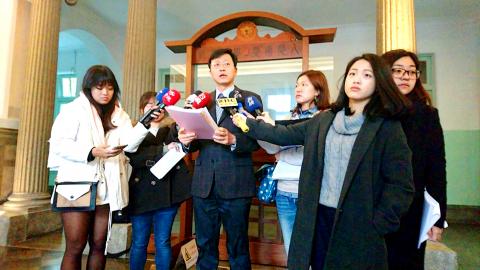National Taiwan University (NTU) yesterday released stage-two investigation results on an academic fraud scandal involving professor Kuo Min-liang (郭明良), which saw the university move to fire Kuo and professor Chang Cheng-chi (張正琪), while clearing NTU president Yang Pan-chyr (楊泮池), who cowrote four problematic papers published by Kuo’s team.
Two internal investigation teams and an investigation committee comprising members from outside the institution found that Kuo’s research team presented a host of misleading images in six papers, of which two have been retracted by science journals Nature Cell Biology and the Journal of Biological Chemistry.
The sheer number of problematic images was proof that Kuo “purposefully” added them to the papers, the report said.

Photo: Hsiao Yu-hsin, Taipei Times
The problems manifested in 2006, when Kuo — as the papers’ corresponding author — was responsible for supervising research work, but he chose to neglect the issue and involved a number of his graduate, doctoral and postdoctoral researchers in the presentation of more errors, it said.
The university decided to dismiss Kuo, who should assume “the greatest and ultimate responsibility,” it said.
Chang, whose name was absent from the first-stage investigation results, duplicated and improperly edited several images in four papers, including the 2008 article, of which she was the lead author, the investigation found.
She has been disqualified as a professor, dismissed, barred from re-applying for a teaching position at the university for five years and prohibited from requesting research grants from the school for five years.
Yang, who coauthored four problematic papers, “bears no responsibility” for the falsified data presented in the papers and therefore “has no reason to resign,” the university said.
In a 19-page report, the committee said Yang only provided some general advice on the direction of the research and his clinical insights on the four papers.
Yang’s involvement was limited to the parts he contributed and coauthors were responsible for checking their contributions to the paper, the committee said.
“By a vote of six to zero, our committee concluded that, based on Ministry of Science and Technology regulations, Dr Yang bears no responsibility for the manipulated figures that mainly involve immunoblots,” the committee said.
One of the questions the committee said it assessed was whether Yang should resign in the way former Minister of Education Chiang Wei-ling (蔣偉寧) did over an academic misconduct scandal 2014.
The question has been raised by educators who called for Yang to step down.
Chiang was unknowingly listed by his former student Chen Cheng-wu (陳震武) as a coauthor in a fake online peer review ring Chen helped create in an attempt to have work published by international journals.
Yang’s case fundamentally differs from the earlier case in the nature and the magnitude of the offense, the committee said.
“Therefore, we feel that it is inappropriate to suggest that, based on this earlier case, President Yang should resign,” it said.

EXPRESSING GRATITUDE: Without its Taiwanese partners which are ‘working around the clock,’ Nvidia could not meet AI demand, CEO Jensen Huang said Taiwan Semiconductor Manufacturing Co (TSMC, 台積電) and US-based artificial intelligence (AI) chip designer Nvidia Corp have partnered with each other on silicon photonics development, Nvidia founder and CEO Jensen Huang (黃仁勳) said. Speaking with reporters after he met with TSMC chairman C.C. Wei (魏哲家) in Taipei on Friday, Huang said his company was working with the world’s largest contract chipmaker on silicon photonics, but admitted it was unlikely for the cooperation to yield results any time soon, and both sides would need several years to achieve concrete outcomes. To have a stake in the silicon photonics supply chain, TSMC and

‘DETERRENT’: US national security adviser-designate Mike Waltz said that he wants to speed up deliveries of weapons purchased by Taiwan to deter threats from China US president-elect Donald Trump’s nominee for US secretary of defense, Pete Hegseth, affirmed his commitment to peace in the Taiwan Strait during his confirmation hearing in Washington on Tuesday. Hegseth called China “the most comprehensive and serious challenge to US national security” and said that he would aim to limit Beijing’s expansion in the Indo-Pacific region, Voice of America reported. He would also adhere to long-standing policies to prevent miscalculations, Hegseth added. The US Senate Armed Services Committee hearing was the first for a nominee of Trump’s incoming Cabinet, and questions mostly focused on whether he was fit for the

IDENTITY: Compared with other platforms, TikTok’s algorithm pushes a ‘disproportionately high ratio’ of pro-China content, a study has found Young Taiwanese are increasingly consuming Chinese content on TikTok, which is changing their views on identity and making them less resistant toward China, researchers and politicians were cited as saying by foreign media. Asked to suggest the best survival strategy for a small country facing a powerful neighbor, students at National Chia-Yi Girls’ Senior High School said “Taiwan must do everything to avoid provoking China into attacking it,” the Financial Times wrote on Friday. Young Taiwanese between the ages of 20 and 24 in the past were the group who most strongly espoused a Taiwanese identity, but that is no longer

A magnitude 6.4 earthquake and several aftershocks battered southern Taiwan early this morning, causing houses and roads to collapse and leaving dozens injured and 50 people isolated in their village. A total of 26 people were reported injured and sent to hospitals due to the earthquake as of late this morning, according to the latest Ministry of Health and Welfare figures. In Sising Village (西興) of Chiayi County's Dapu Township (大埔), the location of the quake's epicenter, severe damage was seen and roads entering the village were blocked, isolating about 50 villagers. Another eight people who were originally trapped inside buildings in Tainan